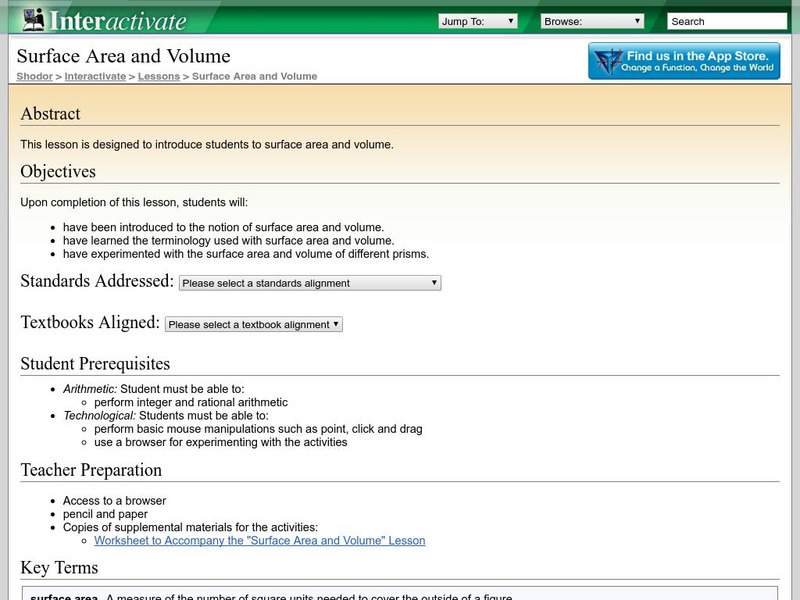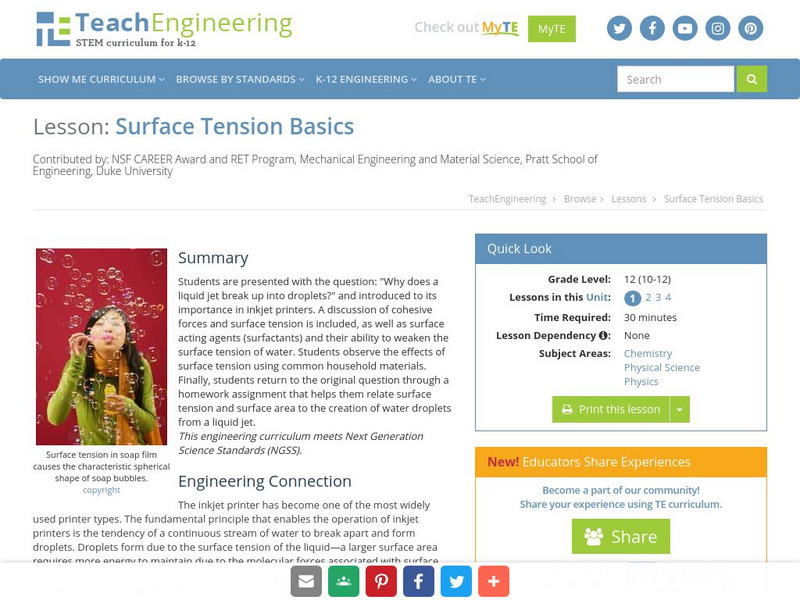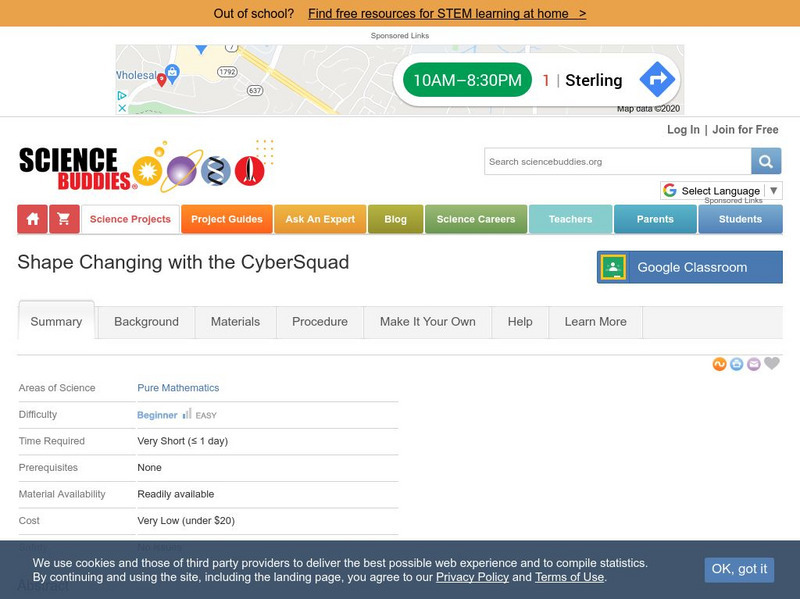Better Lesson
Better Lesson: Covering and Filling: Surface Area & Volume of Rectangular Prisms
Students apply their knowledge of surface area and volume to solve some problems for a box company. This instructional activity contains a detailed lesson plan, video explanations, rubrics, group work guidelines, slides containing...
Better Lesson
Better Lesson: Nets and Surface Area
A conceptual understanding of finding surface area using nets instead of a formula.
Shodor Education Foundation
Shodor Interactivate: Surface Area of a Rectangular Prism
This lesson teaches students how to find the surface area of rectangular prisms.
Shodor Education Foundation
Shodor Interactivate: Surface Area of Prisms
This lesson teaches students how to find the surface area of non-rectangular prisms.
Alabama Learning Exchange
Alex: Surface Area of Pyramids and Cones
In this inquiry-based lesson, students will discover the formulas for the surface area of pyramids and cones. This lesson plan was created by exemplary Alabama Math Teachers through the AMSTI project.
Shodor Education Foundation
Shodor Interactivate: Lesson: Surface Area and Volume
Middle schoolers explore surface area and volume through this lesson and worksheet activity.
Better Lesson
Better Lesson: Review of Ccss 6.g.1,2,3,4 Volume and Surface Area
Practicing math problems to prepare for a geometry assessment involving volume and surface area.
Scholastic
Scholastic: Setting the Stage With Geometry
Students will learn and reinforce skills for measuring perimeter and area of 2D shapes and measuring surface area and volume of 3D shapes.
Texas Instruments
Texas Instruments: Simple Programs to Apply Formulas
Students learn how to write simple programs to evaluate formulas in several variables for lists of data. They apply these skills to the computation of areas, volumes and surface areas of familiar geometric solids.
TeachEngineering
Teach Engineering: Surface Tension Basics
Young scholars are presented with the question: "Why does a liquid jet break up into droplets?" and introduced to its importance in inkjet printers. A discussion of cohesive forces and surface tension is included, as well as surface...
CPALMS
Cpalms: Building Graduation Caps
[Free Registration/Login Required] In this lesson, students build geometric models of graduation caps using stiff paper. The activity requires the application of skills in finding surface area, understanding similarity, knowing the...
Illustrative Mathematics
Illustrative Mathematics: G Mg How Thick Is a Soda Can? Variation I
In this task, students are given the dimensions of a soda can and are asked to estimate its thickness. They must first find the surface area and the volume of aluminum. Aligns with G-MG.A.1 and G-MG.A.2.
TeachEngineering
Teach Engineering: Boxed in and Wrapped Up
Students find the volume and surface area of a rectangular box (e.g., a cereal box), and then figure out how to convert that box into a new, cubical box having the same volume as the original. As they construct the new, cube-shaped box...
University of Texas
Inside Mathematics: Building Blocks [Pdf]
This task challenges students to demonstrate understanding of area, surface area and volume.
Science Buddies
Science Buddies: Shape Changing With the Cyber Squad
In this project, you will make 2-dimensional templates, called nets, that fold up into 3-dimensional (3-D) shapes. By making shapes of different sizes, you will be able to see how 3-D shapes change with size. In your findings you will...
National Gallery of Art
National Gallery of Art: Thiebaud's Cake Math (Intermediate Version)
Using the painting, Cakes by artist Wayne Thiebaud, students will learn and practice math concepts of volume and surface area. Then they will create a bold cake painting, either online or with classroom art materials.
Alabama Learning Exchange
Alex: Effects of Friction on a Moving Block
Students will move a 2 X 4 inch block with a hook attached across different surface areas. Students will discover how the friction created by these surface areas affect the movement of the block. Students will begin the activity by...
Alabama Learning Exchange
Alex: Figure It Out
This is an Internet-based (online) and group discussion lesson. Students will learn the formulas for surface area and volume of cylinders and cones. Students should have previously learned how to determine the area for a circle; however,...
Alabama Learning Exchange
Alex: Mentos, Soda, and Nucleation
In this lesson, Mentos candy and different types of soda are used to show examples of nucleation, surface tension, surface area, polar attractions, and supersaturated materials. A video will be used to show the examples and the students...
Better Lesson
Better Lesson: Creating a Robot (2 Days)
What do tin foil, surface area, and rectangular prisms make? A tin foil robot of course! This lesson includes practice problems about surface area, worksheets, a video explanation, and a reflection sheet.
Better Lesson
Better Lesson: Geometry Assessment
Sixth graders solve real-world and mathematical problems involving area, volume and surface area.
Other
Sprk: Sphero Hydro Hypothesis Stem Challenge [Pdf]
SPRK STEM challenges are fun, interactive activities that challenge students to use creativity and team-work to move through simple steps of the design process in order to build Sphero-based creations. The Hydro-hypothesis challenge...
Illustrative Mathematics
Illustrative Mathematics: 8.g Shipping Rolled Oats
For this task, 8th graders must determine the optimal dimensions of a cardboard box that will hold six cylinders of oats. To do this, they need to make surface area and volume calculations. Aligns with 8.G.C.9.
Alabama Learning Exchange
Alex: How Big Can a Bee Be?
Students will study the relationship between surface area and volume. Math, science, and technology components are included.
Other popular searches
- Surface Area and Volume
- Surface Area and Net
- Cylinder Surface Area
- Surface Area of Prisms
- Surface Area Volume
- Surface Area of Cylinders
- Finding Surface Area
- Surface Area Cone
- Surface Area Volume Cylinder
- Surface Area Lesson
- Cylinder Surface Area Nets
- Lateral Surface Area














